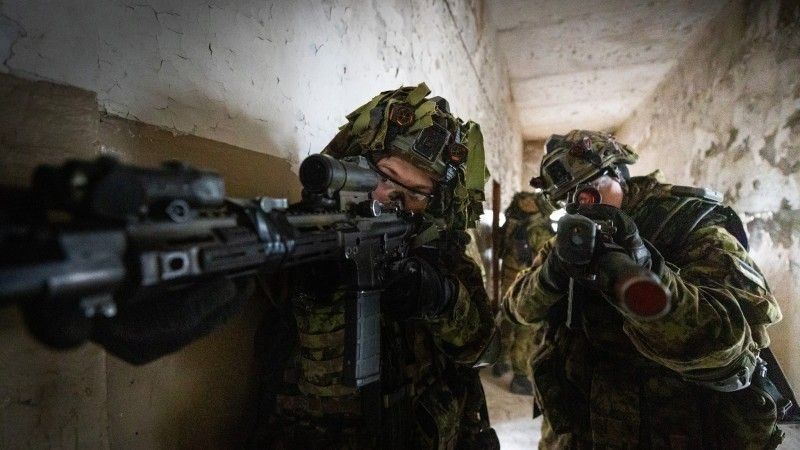Geopolitics
Estonia Recognizes Growing Threat from Russia

Photo. Sõdurileht/Facebook
Estonia recognizes a growing threat from Russia. Since gaining independence, Tallinn has harbored concerns related to Moscow’s imperialistic foreign policy. Following the invasion of Ukraine in February 2022 and numerous statements indicating the Baltic countries as potential targets, substantial investments in armaments have been initiated. Additionally, there is a focus on joint NATO exercises, primarily with the Republic of France. Presently, Estonia is apprehensive about a possible attack from the East and observes the increasing production of weaponry in Russia. However, it maintains faith in collective defense with the support of allies.
Estonia rejects its Soviet past and fully concentrates on aiding Ukraine. There is a conviction in the country that optimal conditions must be created for the NATO forces stationed there. Historical memory holds significant importance and is passed down from generation to generation. The Estonian nation has few illusions about the quality and way of life under Russian rule due to successive waves of Russification, deportations, and ruthless treatment by Russia. Simultaneously, the prolonged war in Ukraine leads to further militarization of all states on the eastern flank of NATO.
A Glimpse into History
On February 24, 1918, Estonia declared independence, establishing the foundations of its statehood. In a two-year war for independence, the armed forces expelled Soviet troops from the newly formed state. A constitutional assembly was also elected, laying the groundwork for Estonian nationhood. On February 24, 2022, Estonia commemorated the 104th anniversary of independence in Tallinn and across the country, overshadowed by Russia’s aggression in Ukraine. Another anniversary is approaching in a few days.
Following the Russian attack on a neighbor, Estonia’s past resurfaced in a sad form, bringing back memories of the brief statehood terminated by the Soviet invasion in June 1940. The tragic consequences included Russification, arrests of Estonian military personnel and political activists, mass deportations to Siberia, and enlistment into Russian units and labor battalions in distant garrisons. Many of these individuals never returned due to tragic living conditions, hard labor, cold, or brutal treatment by the Russians.
There were also attempts to denationalize Estonians by destroying cultural centers, taking over the education system, and even seizing cemeteries like the Military Cemetery in Tallinn. Many cities, islands, and objects of military significance ceased to be universally accessible to Estonians. Despite repression, the Estonian nation survived, aspiring to create a democratic state based on values. These memories remain vivid and are passed down from generation to generation, even today.
Two years ago, Russian expansionist ideas reappeared in Kremlin narratives, acknowledged by Estonian politicians and the public. Aggressive rhetoric and physical violations of airspace and maritime borders were consistently present in relation to the Baltic countries, even if not as much for the rest of the world. The concept of „hybrid warfare” has been used to influence Estonia, particularly its Russian-speaking community, comprising about 25% of the population.
Ongoing concerns and Tallinn's faith
When the President of Ukraine announced that Estonia would be the next target of Russian attacks, the entire country experienced a sense of urgency. Tallinn has been under growing pressure for several years due to Kremlin’s words and actions. Although there is immense faith in NATO’s capabilities and collaboration with the USA, UK, France, and especially Finland (joining the alliance, along with Sweden, in helping „close” the Baltic Sea), it is deemed insufficient. Society also understands the gravity of the situation.
Chairman of the Committee on National Defence in Estonia,s parliament (Riigikogu), Kalev Stoicescu:”An attack by Russia against NATO in 2024 is unlikely. The likelihood may increase in the near future, in a 2-3 years perspective, if Russia is able to gain the initiative and force Ukraine to accept peace on Moscow’s terms, and Russia’s economic and military potential largely recovers. There are a lot of unknowns in this equation. In addition, one cannot exclude the element of surprise, i.e. a major black or white swan. The situation will evolve depending first of all on the political determination of the conflicting sides, and obviously on their resources”.
The prolonged war in Ukraine leads to further militarization of Estonia and the surrounding region, including Poland. In Tallinn, there is a sense that the longer Kyiv remains strong, the further Moscow is from its plans to attack the Baltic countries. There is also significant trust in NATO, with no one daring to question its integrity and stability. Estonians comprehend the essence of international cooperation, evident in their support to Poland during the crisis on the Belarusian border, involvement in the Sahel region supporting France, and consistent participation in NATO exercises.
Strength in calmness
Estonian Defense Forces Commander Gen. Martin Herem stated that NATO’s predictions regarding Russian forces reaching the limits of their weapon resources did not come true. He added that the Russian Federation’s military is capable of producing several million artillery shells annually, significantly exceeding European efforts, and can recruit hundreds of thousands of new soldiers, especially from the eastern regions of the country. While this diagnosis is critical and uncompromising, it does not in any way undermine Estonia’s faith in cooperation and actions within NATO.
Ramon Loik, Internal Security Institute of the Estonian Academy of Security Sciences:”The Armed Forces of the Russian Federation have lost most of their elite units, the best of army officers and offensive combat capability in Ukraine, the recovery of which may take 5–10 years, according to various estimates. It primarily depends on the duration and outcome of the ongoing war. NATO countries must increase their military capabilities continuously and in an accelerated manner.
Another army reform has been launched in Russia until 2026. Considering the importance of the military in supporting the Kremlin’s vertical of power and in society’s identity in general, the regime’s security and Russia’s strategic capability for the next decade depend on the dynamics of the launched army reform.
As Russia has switched to a strategy of prolonged war of attrition in Ukraine, mass recruitment has become a key issue for the Kremlin. The Russian authorities and occupation administrations also continue to force Russian Federation citizenship and mobilization into the armed forces in the occupied territories of Ukraine. However, recruits become combat-capable units only after prolonged training, exercise and proper equipping. As the war of aggression against Ukraine so far has shown, Russia has complex problems in fulfilling the first, second and third conditions. Ukraine should take advantage of this retardation for its own military success.
It is important for Estonia to continuously work against the strengthening of Russia’s military power, including continuing to invest in early warning, comprehensive security and maintaining an active deterrence initiative in the Baltic Sea area, as well as developing a highly integrated cooperation capability on NATO’s northeastern flank.”
Estonians are investing millions in armaments, opting not only for purchases from Americans but also choosing Polish „Piorun” missiles. They are considering further investments in drones and radars. Tallinn is aware of the growing danger and hybrid threats from the Kremlin. Nonetheless, Estonia is confident in its allies and its ability to maintain defense on NATO’s eastern flank for as long as it can. While the fact that Russia is considering invasions in the Baltic countries is acknowledged, being in Tallinn does not instill fear. The beginning of victory is courage.
